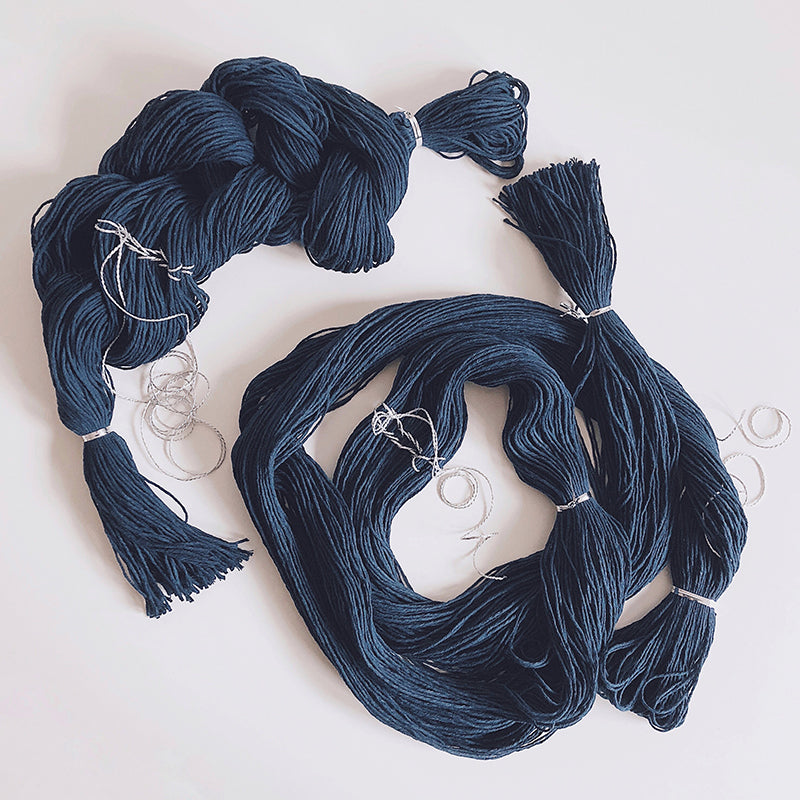Shopping Cart
*continental US addresses only
*continental US addresses only
Your Cart is Empty

Understanding what makes a good warp yarn or warp thread for weaving is a foundational skill for every weaver to learn. The best yarn for your weaving project will depend on a number of factors. This post will go over some general rules and tips/tricks for choosing the best warp yarn for your project.
The type of weaving you plan to do will greatly influence the type of warp thread you’ll need and the type of fibers you will choose.
For tapestry weaving, rugs, and other weft-faced weaving projects where you will beat your weft very hard, you will want a very strong wool, linen, or cotton warp designed specifically to be held at high tension.
You can see all of the warp yarn we recommend for tapestry and rug weaving here.
When weaving towels, placemats, or other home textiles, you want to use a soft, sturdy yarn that can easily handle the loom tension during warping, and that is machine washable and will stand up to years of use.
Our Mallo, Duet, and Beam yarn lines are all yarns to use as warp and as weft in towels, placemats, and other home textiles.
If you are making a wool, silk, or alpaca shawl, you likely won’t be beating as hard as a tapestry or home textile, so the yarn doesn't have to be as hardy. However, it still needs to be strong enough to handle tension and abrasion in the heddles, which we discuss below.
Sero Silk Noil and Ode Alpaca make wonderful warp and weft yarns for weaving scarves, shawls, or other fabric.
It is important that warp yarn is strong enough to withstand tension between the two beams, as well as handle abrasion from the heddles and reed as the shafts move and the weft is packed with the beater (on a floor or table loom), or as you lift and lower the rigid heddle reed to create weaving sheds (for rigid heddle loom weaving). At the same time, it can't be so stretchy that you lose your tension.
The “Snap Test” is one common way to determine if a yarn is suitable for warp. Try to snap 6” of the yarn hard between your hands. If it doesn’t break—great—it will likely make a good warp yarn!
Linen yarn is very strong and won’t typically snap, but has a reputation for abrading and breaking while weaving. And many yarns that fail the snap test are fantastic warp yarns because in a warp, the tension is distributed across many threads, thus decreasing the stress on any single strand.
This is why it is important to have good, even tension across your warp. So here’s a little refinement of the snap test: if the yarn breaks with a clear, clean, audible “snap,” it’s probably ok for a warp. If it pulls apart quietly (like softly spun single ply yarns often do), it probably is not a great choice for warp. Almost all yarn in our shop is suitable for warp on a floor or rigid heddle loom (if it’s not, it will say so in the description).
As a general rule, plied yarns (yarns that are twisted with more than one ply) will be easier to use for warp because they tend to be stronger and more balanced. But that doesn’t mean that a single spun yarn can’t be used successfully!
And of course, a yarn with multiple plies also needs to be sampled with and tested for strength to determine if it is a suitable warp yarn. Just because it sounds right on paper, doesn't mean it will work - testing for strength and sampling is always important!
All three of the yarns below can be used for both warp and weft, whether you weave on a rigid heddle loom or multi-shaft loom.
This 3/2 organic un-mercerized cotton is soft, hardy, and beginner-friendly, designed for making towels, home textiles, and apparel. 100% organic cotton.
See all colorsA thick and thin cotton slub yarn designed to weave soft and absorbent home textiles, scarves, or apparel. 100% cotton (55% organic).
See all colorsA versatile yarn, Duet is strong enough for warp, soft enough for garments, and hardy enough for kitchen towels. 55% European tow linen and 45% USA-grown cotton.
See all colors